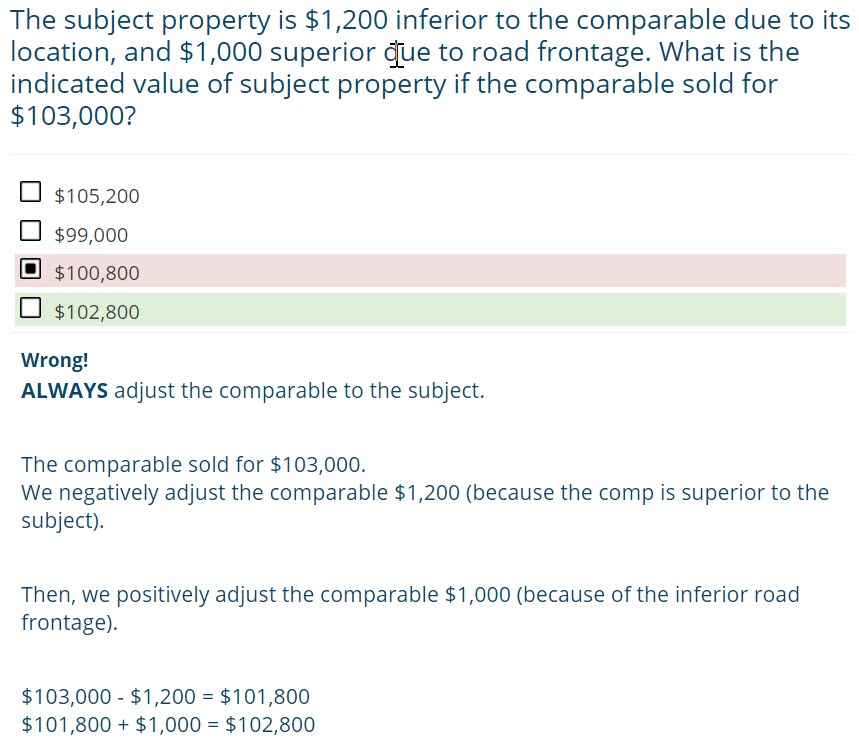Ever considered a career as an appraiser? A real estate appraiser estimates the market value of residential and commercial properties. How do you become a real estate appraiser, you ask? The process involves choosing the right type of appraisal career, completing coursework, passing an exam, and completing field hours with supervision. To make it easy, I’ve organized this step-by-step guide to show you how to become a real estate appraiser. Let’s jump in!
1. Complete Required Coursework to Become a Trainee
Learning how to become a real estate appraiser can be confusing since state requirements vary. However, in every US state, the requirements to become a real estate appraiser start with being an appraisal trainee. Becoming a trainee is done by completing and passing the required coursework. The Appraiser Qualifications Board (AQB) sets national course requirements, but some states require additional coursework.
To become an appraisal trainee, the AQB requires you to complete 75 credit hours of educational content from an approved provider. The required core curriculum coursework, which cannot be substituted by experience, is broken out as follows:
- Basic Appraisal Principles (30 hours): This course introduces aspiring appraisers to basic real property concepts, legal considerations, real estate finance, economic principles, and appraisal ethics.
- Basic Appraisal Procedures (30 hours): This course teaches students about the actual valuation process, including the three traditional approaches to value—a cost approach, a sales comparison approach, and an income approach—and how to collect data, describe the subject property, and communicate appraisal results.
- National Uniform Standards of Professional Appraisal Practice (USPAP) (15 hours): The USPAP 15-hour course sets forth industry requirements for ethical behavior and competent performance as described in the USPAP.
In addition, some states require more classroom hours to learn how to become a home appraiser besides the national course requirements. The 15-hour USPAP trainee class is still required, as are additional state-specific requirements. Here’s a quick breakdown of what it takes to be a real estate appraiser in each state:
Course Hours Required |
|
|---|---|
Pennsylvania, Vermont, Wyoming | |
If you feel overwhelmed about completing 75 hours of education or more, choose your education provider wisely. The right school will provide various course options and engaging course material. Some schools offer individual courses so you can complete your hours bit by bit, but bundled classes are typically more cost-efficient.

McKissock Learning is an excellent education provider that offers real estate appraisal classes in all states. Its course packages include webinars, instructor Q&As, printed textbooks, study calendars, and proctored exams.
Did You Know? There are a variety of career options within the appraisal field. This guide is focused on how to become a land appraiser, also known as a real property appraiser. However, there are other types of appraisers, which include:
- Appraiser assistant
- Personal property appraiser
- Business valuation analyst
- Mass appraiser
2. Tackle Appraiser Fieldwork Experience Hours
After becoming an appraiser trainee, you must start working under the mentorship of a licensed real estate appraiser. Before moving on to the next level of appraiser licensing, the national requirements state you complete a minimum of 1,000 hours of supervised work within six months. In addition, some states require up to 2,500 hours of supervised work to become a real estate appraiser.
Here’s a breakdown of the required number of supervised hours you need to become a housing appraiser in each state:
Getting a position as a real estate appraisal trainee can be challenging, but you may be able to find jobs at residential appraisal firms and banks. These organizations generally have the greatest need for real estate appraisal services. Look at job boards through Indeed or the American Society of Appraisers. The most important thing is to ensure you work under a certified appraiser and keep track of your hours.
3. Pass Your State’s Appraiser Licensing Exam

Once you’ve fulfilled your state’s required hours of supervision or real estate property appraisal training, the next step to becoming an appraiser is passing the national exam. The Licensed Residential exam consists of 110 questions and must be completed within four hours. Depending on your state and location, your exam will be administered by one of these approved exam providers:
Search each website to find your area’s real estate appraiser exam schedule. There will be an exam fee at the time of registration, which will range from $950 to $2,710, depending on your state and the type of exam. Read your state testing center’s candidate handbook for details about when to arrive, what to bring, how to prepare, and how the exam will work.
4. Submit Your Licensed Residential Appraiser Application
After you’ve met all the qualifications, you must submit a license application to your state’s regulatory board. State application requirements vary but generally include background information, evidence of course completion, employment history, and an experience report.
Once your real estate appraisal license is approved, you can begin working as a real estate appraiser with limitations on what types of property you can appraise. As a licensed residential appraiser, you can only appraise non-complex, one- to four-unit residential properties worth less than $1 million and complex, one- to four-unit residential properties worth less than $400,000.
For a review of your state’s requirements and the application documents needed to apply for a real estate appraiser license/certification, choose your state from the drop-down:
Appraiser Licensing Requirements by State
Prelicensing Coursework Hours: 150 hours, including a 15-hour USPAP
Field Training Hours: 1,000 hours
Is an exam required?: Yes
Prelicensing Coursework Hours: 225 hours, including a 15-hour USPAP
Field Training Hours: 2,500 hours
Is an exam required?: Yes
Prelicensing Coursework Hours: 150 hours, including a 15-hour USPAP
Field Training Hours: 1,000 hours
Is an exam required?: Yes
Prelicensing Coursework Hours: 75 hours, including a 15-hour USPAP
Field Training Hours: 1,000 hours
Is an exam required?: Yes
Prelicensing Coursework Hours: 150 hours, including a 15-hour USPAP
Field Training Hours: 1,000 hours
Is an exam required?: Yes
Prelicensing Coursework Hours: 150 hours, including a 15-hour USPAP
Field Training Hours: 1,000 hours
Is an exam required?: Yes
Prelicensing Coursework Hours: 200 hours, including a 15-hour USPAP
Field Training Hours: 2,500 hours
Is an exam required?: Yes
Prelicensing Coursework Hours: 150 hours, including a 15-hour USPAP
Field Training Hours: 1,000 hours
Is an exam required?: Yes
Prelicensing Coursework Hours: 200 hours, including a 15-hour USPAP
Field Training Hours: 1,500 hours
Is an exam required?: Yes
Prelicensing Coursework Hours: 150 hours, including a 15-hour USPAP
Field Training Hours: 2,000 hours
Is an exam required?: Yes
Prelicensing Coursework Hours: 150 hours, including a 15-hour USPAP
Field Training Hours: 1,000 hours
Is an exam required?: Yes
Prelicensing Coursework Hours: 150 hours, including a 15-hour USPAP
Field Training Hours: 1,000 hours
Is an exam required?: Yes
Prelicensing Coursework Hours: 200 hours, including a 15-hour USPAP
Field Training Hours: 1,500 hours
Is an exam required?: Yes
Prelicensing Coursework Hours: 200 hours, including a 15-hour USPAP
Field Training Hours: 2,500 hours
Is an exam required?: Yes
Prelicensing Coursework Hours: 200 hours, including a 15-hour USPAP
Field Training Hours: 1,500 hours
Is an exam required?: Yes
Prelicensing Coursework Hours: 150 hours, including a 15-hour USPAP
Field Training Hours: 1,000 hours
Is an exam required?: Yes
Prelicensing Coursework Hours: 150 hours, including a 15-hour USPAP
Field Training Hours: 1,000 hours
Is an exam required?: Yes
Prelicensing Coursework Hours: 200 hours, including a 15-hour USPAP
Field Training Hours: 2,500 hours
Is an exam required?: Yes
Prelicensing Coursework Hours: 150 hours, including a 15-hour USPAP
Field Training Hours: 1,000 hours
Is an exam required?: Yes
Prelicensing Coursework Hours: 150 hours, including a 15-hour USPAP
Field Training Hours: 2,000 hours
Is an exam required?: Yes
Prelicensing Coursework Hours: 150 hours, including a 15-hour USPAP
Field Training Hours: 1,000 hours
Is an exam required?: Yes
Prelicensing Coursework Hours: 150 hours, including a 15-hour USPAP
Field Training Hours: 1,000 hours
Is an exam required?: Yes
Prelicensing Coursework Hours: 150 hours, including a 15-hour USPAP
Field Training Hours: 1,000 hours
Is an exam required?: Yes
Prelicensing Coursework Hours: 150 hours, including a 15-hour USPAP
Field Training Hours: 2,000 hours
Is an exam required?: Yes
Prelicensing Coursework Hours: 150 hours, including a 15-hour USPAP
Field Training Hours: 1,000 hours
Is an exam required?: Yes
Prelicensing Coursework Hours: 150 hours, including a 15-hour USPAP
Field Training Hours: 2,500 hours
Is an exam required?: Yes
Prelicensing Coursework Hours: 150 hours, including a 15-hour USPAP
Field Training Hours: 2,000 hours
Is an exam required?: Yes
Prelicensing Coursework Hours: 153 hours, including a 15-hour USPAP
Field Training Hours: 2,400 hours
Is an exam required?: Yes
Prelicensing Coursework Hours: 150 hours, including a 15-hour USPAP
Field Training Hours: 2,000 hours
Is an exam required?: Yes
Prelicensing Coursework Hours: 150 hours, including a 15-hour USPAP
Field Training Hours: 1,000 hours
Is an exam required?: Yes
Prelicensing Coursework Hours: 150 hours, including a 15-hour USPAP
Field Training Hours: 1,000 hours
Is an exam required?: Yes
Prelicensing Coursework Hours: 150 hours, including a 15-hour USPAP
Field Training Hours: 1,000 hours
Is an exam required?: Yes
Prelicensing Coursework Hours: 150 hours, including a 15-hour USPAP
Field Training Hours: 1,000 hours
Is an exam required?: Yes
Prelicensing Coursework Hours: 150 hours, including a 15-hour USPAP
Field Training Hours: 2,000 hours
Is an exam required?: Yes
Prelicensing Coursework Hours: 150 hours, including a 15-hour USPAP
Field Training Hours: 1,000 hours
Is an exam required?: Yes
Prelicensing Coursework Hours: 150 hours, including a 15-hour USPAP
Field Training Hours: 1,000 hours
Is an exam required?: Yes
Prelicensing Coursework Hours: 150 hours, including a 15-hour USPAP
Field Training Hours: 2,000 hours
Is an exam required?: Yes
Prelicensing Coursework Hours: 200 hours, including a 15-hour USPAP
Field Training Hours: 1,500 hours
Is an exam required?: Yes
Prelicensing Coursework Hours: 150 hours, including a 15-hour USPAP
Field Training Hours: 1,000 hours
Is an exam required?: Yes
Prelicensing Coursework Hours: 150 hours, including a 15-hour USPAP
Field Training Hours: 1,000 hours
Is an exam required?: Yes
Prelicensing Coursework Hours: 150 hours, including a 15-hour USPAP
Field Training Hours: 1,000 hours
Is an exam required?: Yes
Prelicensing Coursework Hours: 150 hours, including a 15-hour USPAP
Field Training Hours: 1,000 hours
Is an exam required?: Yes
Prelicensing Coursework Hours: 150 hours, including a 15-hour USPAP
Field Training Hours: 1,000 hours
Is an exam required?: Yes
Prelicensing Coursework Hours: 150 hours, including a 15-hour USPAP
Field Training Hours: 1,000 hours
Is an exam required?: Yes
Prelicensing Coursework Hours: 200 hours, including a 15-hour USPAP
Field Training Hours: 1,500 hours
Is an exam required?: Yes
Prelicensing Coursework Hours: 150 hours, including a 15-hour USPAP
Field Training Hours: 1,000 hours
Is an exam required?: Yes
Prelicensing Coursework Hours: 150 hours, including a 15-hour USPAP
Field Training Hours: 2,000 hours
Is an exam required?: Yes
Prelicensing Coursework Hours: 150 hours, including a 15-hour USPAP
Field Training Hours: 1,000 hours
Is an exam required?: Yes
Prelicensing Coursework Hours: 150 hours, including a 15-hour USPAP
Field Training Hours: 1,000 hours
Is an exam required?: Yes
Prelicensing Coursework Hours: 200 hours, including a 15-hour USPAP
Field Training Hours: 2,500 hours
Is an exam required?: Yes
5. Find Work as a Licensed Real Estate Appraiser

With your license, it’s time to learn how to be a real estate appraiser. Search for job openings online or consult your network for openings. You’ll likely work for a bank or private appraisal company in the first few years of your career. According to the Bureau of Labor Statistics (BLS), real estate appraisers’ employment is expected to grow by 4% over the next ten years.
To appraise real estate accurately, you’ll need key tools, like access to the multiple listing service (MLS). The MLS provides property sale details needed to research closed and current properties for sale. What you need to be a real estate appraiser depends on the firm you work with, your location, and your goals. For example, some appraisal firms may cover the National Association of Realtors (NAR) cost, which provides access to the MLS and many other tools and resources.
Pro Tip: Some real estate professionals mistakenly believe that the NAR membership is only for agents. However, its resources and local networks are valuable for many different careers within the real estate industry. If you’re considering career options in this field, read about the top real estate career paths.
6. Upgrade Your License
After learning how to be an appraiser and working for a few years, consider upgrading your license for a wider variety of opportunities. Two primary types of real estate appraiser license upgrades are Certified Residential Appraiser and Certified General Appraiser.
Certified residential appraisers can appraise larger, more valuable residential properties than licensed appraisers. On the other hand, general appraisers can appraise all types of properties and typically focus on commercial buildings. Consider upgrading your license to expand your business to more valuable residential or commercial properties.
The main benefit of upgrading your license to be a certified residential appraiser is that you can appraise properties valued at over $1 million. You must meet national and state requirements for appraisal coursework, experience, and college-level education to do so. Once certified, your expertise will be more in demand because many banks prefer to work with certified residential appraisers rather than licensed ones.
To become a certified residential appraiser, meet the following additional requirements:
- Coursework: Certified residential appraisers must complete 200-plus hours of AQB-approved appraisal coursework, including previous coursework.
- Experience: Certified residential appraisers must have at least 1,500 hours of experience working as an appraiser or appraisal trainee for 12 months or more.
- Education: Certified residential appraisers must have a bachelor’s degree, an associate degree, or complete 30 hours of college-level courses, or a combination thereof, as summarized by The Appraisal Foundation. Contact your state’s agency to see how they are adopting new standards and what is required of you to meet them.
As a certified residential appraiser, you can appraise one- to four-unit residential buildings of any complexity or value. You may also appraise vacant or unimproved land that is utilized or best suited for one to four residential units. You’ll need additional certifications to appraise vacant or unimproved land suited for more than four residential units.
The most advanced type of real estate appraiser license is a certified general appraiser. Appraisal professionals can also become certified general appraisers. As a certified general appraiser, there are no limitations on the type of real property you can appraise, including land, residential, and commercial properties. However, most certified general appraisers focus on commercial properties and rarely appraise residential homes.
If you’re evaluating how to become a real estate appraiser at this level, start by looking at the required education. The AQB requires the following:
- Minimum of 300 hours of qualifying education
- Bachelor’s degree from an accredited color or university
- 3,000 hours of non-residential fieldwork within 18 months
Did You Know? Remember that when upgrading your license, some states require appraiser trainees to complete final preparatory coursework or degree programs, such as an associate degree or college-level courses. Even if this is not a national requirement from the AQB, some states ask for additional coursework. For example, New York requires certified residential appraiser applicants to have a Bachelor’s or Associate’s degree in a related field of study.
Pros & Cons of Being a Real Estate Appraiser
Like other real estate professions, becoming an appraiser can be rewarding. However, it can also have its ups and downs. To further help you decide whether real estate appraising is the right career for you, here are some of its pros & cons:
|
|
If you’re curious about other real estate professions, read our article about the jobs you can get with a real estate license.
FAQs: How to Become a Real Estate Appraiser
What does it take to become an appraiser?
How do you become a real estate appraiser? Complete the required coursework, work with a supervisor appraiser, gain more hours of appraisal experience, and pass the licensing exam. Read our step-by-step guide above for more information. Additionally, if you’re an aspiring appraiser, following real estate blogs will help you as they provide insights on appraising and market trends.
How long does it take to become a real estate appraiser?
Depending on your state, you’ll need at least 150 hours of prelicensing education and 1,000 hours of appraisal experience. How long it takes to become an appraiser depends on how much time you need to complete your required education, experience, and license exam. Remember, good things take time, and becoming an appraiser will surely be a rewarding career for you.
How much money does a real estate appraiser make?
It all depends on the years of experience, location, and education, but according to Indeed, a licensed real estate appraiser in the United States earns an average base salary of $61,492 annually.
Bringing It All Together
Learning how to become a real estate appraiser is a straightforward process, but it requires significant time, effort, and hours of practice. However, once you know how to become an appraiser, it can be a lucrative career with excellent income potential.












Add comment